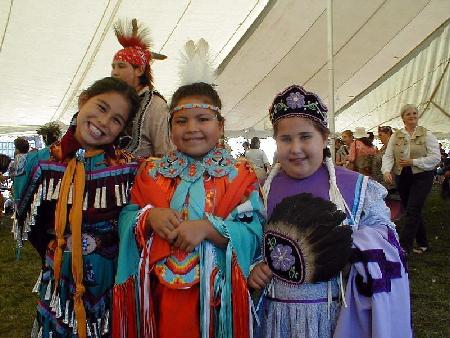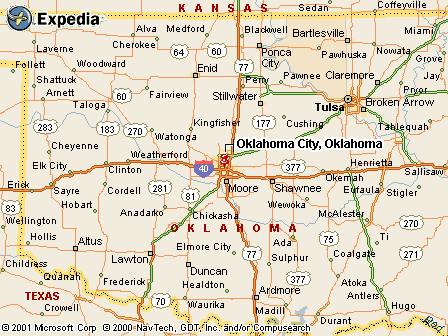|
|
Canku Ota |
|
|
(Many Paths) |
||
|
An Online Newsletter Celebrating Native America |
||
|
August 11, 2001 - Issue 42 |
||
|
|
||
|
Heritage Dances to Different Drummer |
||
|
by Karen Klinka Staff Writer The Oklahoman-August 1, 2001 |
 Oklahoma
City, OK - Walking into Eugene Field Elementary School, a visitor could feel the throb of Indian drums almost before
hearing them. Oklahoma
City, OK - Walking into Eugene Field Elementary School, a visitor could feel the throb of Indian drums almost before
hearing them.Inside the large two-story commons area, about 200 American Indian students, teachers and parents recently gathered for a powwow that included dancing, music and feasting on homemade Indian tacos. The powwow marked the second to last day of the Oklahoma City School District's summer day camp for elementary-age children with Indian backgrounds, said Clarissa Ware-Shaw, the district's administrator of Native American Student Services. Ware-Shaw said the annual day camp used dancing and other cultural traditions, like the powwow, to help American Indian school children learn about their history and tribal heritage. While the powwow is actually not a tradition of Oklahoma's Five Civilized Tribes, such gatherings are now recognized by most tribes across the nation as a good way to mark special or social occasions, Ware-Shaw said. "The powwow was practiced more by the Plains tribes, but our kids look forward to having one each year so they can dance," she added. This year the monthlong day camp began July 2 and ended July 27, Ware-Shaw said. The average attendance each day was 66 children. Three buses picked up students at 10 inner-city schools and transported them to Eugene Field each day for the monthlong camp. About two-thirds of the students came from south Oklahoma City. "If we had enough students, we could have had two locations for the day camp," Ware- Shaw said. The annual day camp is funded by a federal grant from the Bureau of Indian Affairs, under the Johnson-O'Malley program. The summer camp includes what Ware-Shaw calls some "academic refreshers" in reading and math, along with segments on Indian history, culture and arts and crafts. Narcy Ka'won, a certified teacher and member of the Cherokee Nation, serves as the camp academic coordinator. Tom Ware, a Kiowa/Comanche musician/composer and professional blues artist from Anadarko, is the camp's cultural coordinator. In addition to providing both breakfast and lunch to students each day, the summer camp follows a set schedule and uses formal lesson plans, Ware-Shaw said. Students' academic skills are tested at the beginning of the summer camp and at the end. "We've found they definitely improve in both math and reading," she added. "Because the camp meets five days a week and lasts a whole month, we have time to do the academics and the cultural component." Ware-Shaw said a key objective is to teach each Indian child about his or her own tribe. "Whether we're focusing on the Five Civilized Tribes, the Plains tribes or Southwest tribes, we still try to teach each child about their own tribal traditions during the camp." This year the students took weekly field trips to the Sam Noble Natural History Museum, on the University of Oklahoma's campus in Norman, and to the Omniplex and Omnidome in Oklahoma City. The grand finale was a trip to Frontier City on the last day of day camp. "We use little incentives like the field trips and going to Frontier City to encourage the students to behave during the school week," she said. Ware-Shaw said teachers and volunteers report few disciplinary problems among day camp students each year. She says she believes that's because good behavior and personal responsibility are among the lessons stressed at the summer camp. "Respect is one of the very first cultural things the students learn," Ware-Shaw said. "They learn about respecting themselves and then to respect others." Tom Ware, Ware-Shaw's brother, has been teaching Indian dancing, music and cultural traditions at the day camp for the past three years. Ware hopes the day camp experience will inspire many students to learn as much about their own tribal traditions as they do about mainstream culture's sports, movies, rap music and the like. "We want our Indian kids to do more than blend in. We want them to be who they are," Ware said after the powwow. Many of the day camp students don't have only Indian backgrounds, he noted. "They may be white, or African-American or Mexican- American, and we tell them, 'Pursue your other half, too. You can do both,' " Ware said. But, above all, Ware counsels camp students to get a good education, as well as learn about their tribal heritage. Being an educated Indian and a traditional Indian is "the best of both worlds," Ware added. "I want to stress to our Indian kids that they can have both," he said. "They can speak their Indian language, still dance at powwows or do beadwork, whatever, but they can also get a master's degree or doctorate and be a teacher, lawyer, doctor or anything else," Ware said. "They can do both, and people out there are proving that right now." |
|
|
|
|
||
|
|
||
| Canku Ota is a free Newsletter celebrating Native America, its traditions and accomplishments . We do not provide subscriber or visitor names to anyone. Some articles presented in Canku Ota may contain copyright material. We have received appropriate permissions for republishing any articles. Material appearing here is distributed without profit or monetary gain to those who have expressed an interest. This is in accordance with Title 17 U.S.C. section 107. | ||
|
Canku Ota is a copyright © 2000, 2001 of Vicki Lockard and Paul Barry. |
||
|
|
|
|
|
The "Canku Ota - A Newsletter Celebrating Native America" web site and its design is the |
||
|
Copyright © 1999, 2000, 2001 of Paul C. Barry. |
||
|
All Rights Reserved. |
||

